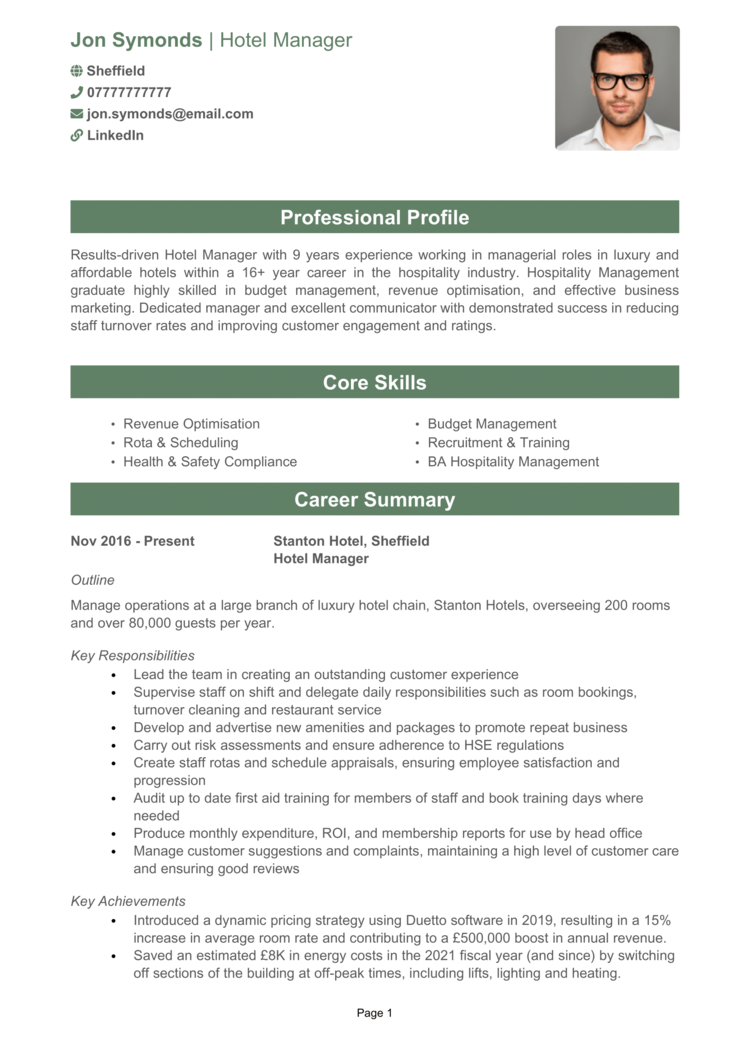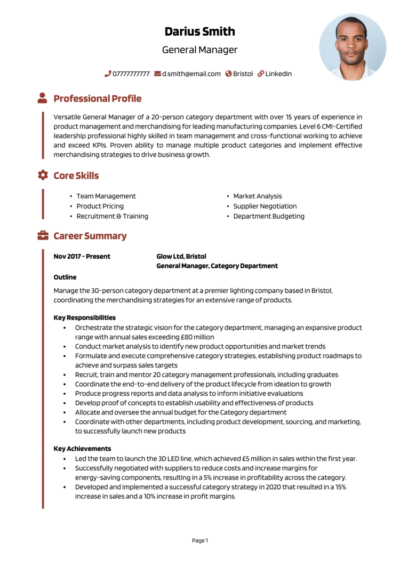Stepping into a General Manager role means taking the wheel of an entire organisation and inspiring your team every step of the way.
Forget bland descriptions and endless bullet points – your CV should instantly tell recruiters that you’re the experienced leader who makes businesses stronger.
This guide and its 2 General Manager CV examples will ensure your application captures your strategic mindset, results-driven approach, and proven leadership skills.
General Manager CV

Hotel General Manager CV

How to write your General Manager CV
Discover how to craft a winning General Manager CV that lands interviews with this simple step-by-step guide.
The best general managers simplify complexity – and your CV should do exactly the same for busy recruiters. A clear, concise CV immediately highlights your management experience, demonstrating how you’ve led teams and overcome organisational challenges.
You don’t need long explanations to prove your value; you just need targeted examples and clear structure. By following this guide and its helpful tips, the process of writing a CV will easily reflect your leadership credentials at first glance, making you a standout candidate in the competitive world of senior management roles.
The correct structure and formatting for a General Manager CV


A confusing CV layout is the professional equivalent of sending an unclear company memo – nobody’s reading it twice. Recruiters have limited time, so the quicker they can find your key information, the stronger your first impression will be.
Here’s the structure to follow:
- Name and contact details – Ensure your name and personal information are easily visible at the top. A photo is optional and depends on the role.
- Profile – Craft a short introduction that showcases your professional background and key accomplishments.
- Core skills – Briefly highlight your leadership and managerial strengths, such as strategic planning, budget management, or operational efficiency.
- Work experience – Outline your career progression in reverse order, emphasising your contributions and successes.
- Education & certifications – Provide details on your academic background, including certifications or specialised training that support your managerial expertise.
- Additional info – Optionally, include professional memberships, relevant industry awards, or related hobbies.
A cluttered CV format full of mistakes won’t impress anyone – especially busy executives. Use bullet points for clarity, divide sections clearly, and stick to a professional, easy-to-read font. Keep it concise, ideally no longer than two pages in length.
CV profile for a General Manager


Your professional profile should clearly showcase your management style, achievements, and leadership strengths. Think of it as the strategic overview of your career – it should immediately convince employers you’re capable of leading teams and driving results, and will bring the same positive impact to their company.
General Manager CV profile examples
Profile 1
Experienced General Manager with six years of expertise in overseeing business operations, driving sales growth, and leading high-performing teams. Skilled in strategic planning, financial management, and operational efficiency. Adept at optimising workflows, improving customer experience, and ensuring compliance with industry regulations. Passionate about delivering business success through strong leadership and data-driven decision-making.
Profile 2
Results-driven General Manager with five years of experience managing multi-site operations, increasing profitability, and implementing process improvements. Adept at team leadership, budget management, and performance optimisation. Skilled in negotiating supplier contracts, streamlining logistics, and enhancing customer service. Dedicated to achieving business objectives and sustaining long-term growth.
Profile 3
Dynamic General Manager with over seven years of experience in retail, hospitality, and corporate environments. Proven track record in managing daily business operations, reducing costs, and maximising productivity. Proficient in staff training, financial forecasting, and business development strategies. Committed to fostering a positive work culture and delivering outstanding service standards.
Details to put in your General Manager CV profile
Here’s what to include:
- Management background – Highlight experience in general management, operations, or strategic roles.
- Leadership strengths – Emphasise your skills in managing teams, leading organisational change, or developing strategic initiatives.
- Industry expertise – Mention key sectors you’ve managed or industries where you’ve delivered strong results.
- Proven achievements – Briefly highlight significant accomplishments, such as improving profitability, growing revenue, or increasing team productivity.
- Career aspirations – Clearly state what type of management role you’re aiming for, showing your enthusiasm and alignment with the company’s vision.
How should you write a core skills section?


General Managers need diverse skills – from strategic thinking and financial management to leadership and communication. Clearly presenting these skills is crucial for capturing recruiters’ attention.
Tailor this section to match the job specification, highlighting skills such as strategic leadership, change management, profit growth, operational oversight, or performance management. Make sure your core skills section includes specific, relevant abilities rather than generic clichés.
Key skills for a General Manager CV
- Strategic Planning and Execution – Developing and implementing business strategies to drive growth, efficiency, and profitability.
- Financial Management – Overseeing budgets, cost control, and financial forecasting to ensure the company’s financial health.
- Team Leadership and Development – Managing staff, fostering a productive work environment, and implementing training programs.
- Operational Efficiency – Streamlining processes, improving workflow, and ensuring smooth day-to-day business operations.
- Sales and Business Development – Identifying new revenue opportunities, negotiating contracts, and expanding market reach.
- Customer Service and Client Relations – Maintaining high service standards and ensuring customer satisfaction to drive retention.
- Performance Monitoring and KPI Tracking – Setting goals, measuring progress, and making data-driven decisions to enhance performance.
- Regulatory Compliance and Risk Management – Ensuring company adherence to legal, financial, and industry regulations.
- Cross-Departmental Coordination – Collaborating with sales, marketing, HR, and finance teams to align company objectives.
- Crisis Management and Problem-Solving – Handling unexpected challenges, resolving operational issues, and ensuring business continuity.
Writing about your work experience


Recruiters value results over vague responsibilities. Clearly outline your management history, demonstrating how you’ve driven organisational growth, improved operations, or successfully managed budgets and teams through your practical work experience.
Your past roles aren’t just bullet points – they’re your success stories. List roles in reverse chronological order, detailing tangible outcomes such as revenue growth, cost savings, improved customer satisfaction, or successful project delivery.
For candidates stepping up from a departmental management role, emphasise transferable leadership achievements and strategic initiatives you’ve undertaken.
Formatting your job history for your CV

- Outline – Provide a concise summary of the company, its sector, and your role as General Manager.
- Responsibilities – Clearly list key duties, such as overseeing budgets, strategic planning, and team leadership. Use action verbs like “directed,” “streamlined,” and “expanded.”
- Achievements – Highlight measurable results, including improved profitability, increased efficiency, or team development accomplishments.
Work experience samples for General Managers
General Manager | Everstone Hospitality
Outline
Managing daily operations for a leading hospitality chain, ensuring exceptional service standards, financial efficiency, and team leadership.
Responsibilities
- Oversaw staff recruitment, training, and performance management for a team of 50+ employees.
- Developed and implemented business strategies to improve operational efficiency and profitability.
- Managed budgets, financial reporting, and cost control initiatives to maximise revenue.
- Ensured compliance with health, safety, and licensing regulations across multiple locations.
- Led marketing and promotional campaigns to enhance customer engagement and sales.
Achievements
- Increased annual revenue by 35 percent through targeted sales initiatives and customer retention programs.
- Reduced operational costs by 20 percent through supplier negotiations and process streamlining.
- Achieved a 95 percent customer satisfaction rating by implementing service improvement strategies.
General Manager | Mauve Retail Solutions
Outline
Overseeing retail operations for a national chain, managing sales performance, customer experience, and staff development.
Responsibilities
- Led a team of department managers and retail staff to achieve sales targets and KPIs.
- Developed merchandising strategies to optimise product placement and maximise sales.
- Analysed financial reports and implemented cost-saving measures to improve profit margins.
- Monitored inventory levels, ensuring efficient stock control and replenishment processes.
- Implemented customer service training programs to enhance the shopping experience.
Achievements
- Boosted store revenue by 40 percent by optimising sales strategies and staff productivity.
- Reduced stock losses by 15 percent through improved inventory management and security measures.
- Recognised for increasing employee retention by fostering a positive and motivated work environment.
General Manager | Abbott Business Service
Outline
Leading operations for a corporate services firm, driving business growth, financial management, and team leadership.
Responsibilities
- Developed business strategies to enhance operational efficiency and client satisfaction.
- Managed financial planning, including budget forecasting and expenditure control.
- Led cross-functional teams, ensuring effective communication and workflow coordination.
- Oversaw contract negotiations, ensuring cost-effective solutions for business operations.
- Analysed market trends and competitor performance to identify growth opportunities.
Achievements
- Increased company profitability by 30 percent through improved financial management and cost-saving initiatives.
- Expanded client base by 25 percent by implementing innovative service offerings.
- Recognised for driving business transformation and improving operational efficiency.
How to write your education section


Your education and professional training play a critical role in validating your suitability for a General Manager position, but real-world practical experience is more important: so keep this bit brief.
Clearly list relevant qualifications, degrees, management certifications, or executive training courses you’ve completed. Qualifications in business administration, strategic management, finance, or leadership training strengthen your application.
Recommended qualifications for General Managers
- MBA (Master of Business Administration) – A highly respected qualification demonstrating broad business knowledge and strategic capability.
- ILM Level 5/7 in Leadership and Management – Recognised UK certifications validating your leadership and management expertise.
- Chartered Management Institute (CMI) Qualifications – Demonstrates high professional standards in leadership and management.
- Lean Six Sigma Certification – Useful for demonstrating expertise in process improvement and operational excellence.
- Prince2 Project Management Certification – Highlights your capability in managing complex projects and strategic initiatives.





